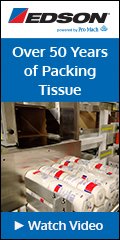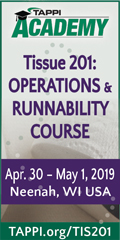
| Archive/Subscribe | TAPPI.org | Advertise | TAPPI Press Catalog | May 2017 |
Lucart's Commitment to a Circular Economy for Paper
The first company to launch a circular economy project in the field of "tissue" paper,
Lucart supports a recycling program in which waste becomes a resource: over 2.8 billion Tetra Pak type® beverage cartons recycled in just four years
In 2010, the partnership between Lucart and Tetra Pak® led to the creation of Fiberpack®, an award-winning project that represents the evolution of paper, combining environmental sustainability and technological innovation. Fiberpack® is a material obtained by recovering the cellulose fibers present in Tetra Pak® type beverage cartons. It is possible to obtain 74% cellulose fibers from just one of these containers, in addition to 22% polyethylene and 4% aluminium, recovering 100% of the components.
In just four years, 2013-2016, the Fiberpack® project has brought great results:
•Over 2.8 billion 1 litre beverage cartons which, if laid next to each other, would equate to a distance going around the Earth 16 times
•More than 1.2 million trees saved thanks to this initiative, a value equal to more than 4,200 football fields
•More than 73,000 tons of CO2 which is equivalent to the emissions produced by more than 578,000 car trips from Rome to Milan
"Fiberpack® is the project that best represents our group's two objectives: environmental sustainability and technological innovation" stated Guido Pasquini, commercial director of the Lucart Group. "We decided to commit to adopting plans for sustainable development, respecting the environment and the welfare of the people. To do this, we conceived of a true circular economic model for paper, which has enabled us to achieve significant results in just four years. We will continue to pursue this commitment with great responsibility, and we have set ourselves the goal of doubling what we managed to achieve in 2016 by 2020, reaching the point of recovering one and a half billion beverage cartons per year".
"At our company, environmental awareness passes through an analysis of the entire life cycle of the containers, from the choice of raw materials, which are mainly renewable, to the design and the post-consumer management" declared Michele Mastrobuono, director of environment and external relations for Tetra Pak - "Fiberpack® is a testament of this commitment. Our commitment comes from sharing our environmental, social and ethical with our partners throughout the entire supply chain".
How Fiberpack® is made: The starting point is recycling. These containers must be folded and compressed once residual food waste has been eliminated, and then the process that will transform them from waste into a secondary raw material begins. After the sterilisation and mechanical processing of the collected cartons, the cellulose fibres are separated from all the other materials.
The fibers recovered through this process form the basis for creating Fiberpack®, a material used to make paper products (toilet paper, napkins, tissues and towels) certified with the EU Ecolabel and distributed by Lucart through the Lucart Professional EcoNatural and Grazie Natural brands. These products, which have a natural light sand color due to the fact that the cellulose fibers are not bleached, are characterized by high levels of robustness, absorbency and softness, and are 100% environmentally friendly.
In addition to cellulose, proper recycling of a Tetra Pak® type cardboard container provides materials such as polyethylene and aluminium. These are used to produce AL.PE.®, a material recovered and re-used by manufacturing industries for numerous purposes, from construction to urban furniture, from everyday objects such as pens and rulers to pallets for transporting goods, from systems for dispensing hand-towels in bathrooms to the mooring poles used in Venice.
Thanks to the Fiberpack® project and the excellent results achieved in recent years, Lucart is now able to offer consumers a product made from recycled paper through a sustainable and transparent design, which is transported on a recycled pallet and used through a recycled plastic dispenser, made from recycling the various components of beverage cartons. This model of product development fully respects the principles of circular economy, which starts from the valorization of waste through proper disposal, and continues up to the point in which they have been fully transformed into secondary raw materials that are ready to be re-used and marketed.
At the 14th edition of the "Sodalitas Social Award 2016", the Fiberpack® project was awarded the prize for "Best in Class", the most prestigious award for corporate sustainability in Italy. That same year, it also won the "Non Sprecare" (Don't Waste) award in the "Companies" category, thanks to its innovative and sustainable approach to the circular economy and consumption.
In 2015, Lucart launched a pilot project in Slovenia along with a number of local partners, which has now become a successful case history as an example of introducing a circular economy system based on recycling Tetra Pak® type beverage cartons.
Lucart, a multi-national Italian industrial group founded in the province of Lucca in 1953, is one of the main producers in Europe of mono-glazed paper and tissue products (paper articles intended for daily consumption, such as toilet paper, kitchen paper, napkins, tablecloths, handkerchiefs, etc.). The company's over 60 years of activity have allowed it to develop great know-how, experience and the technology needed to make top-quality products capable of meeting the customer's needs in the best way possible.
Lucart's production capacity is equal to 319,000 tons of paper/yr, split over 10 continuous machines (one of which for air-laid paper) and 58 converting lines. The company's production activities are distributed over three business units (Business to Business, Away from Home and Consumer) operating in the development and sales of various products with distinctive brands such as Tenderly, Tutto, Grazie Natural and Smile (Consumer area), Lucart Professional, Tenderly Professional, Fato and Velo (Away from Home area).
For further info please visit the website: www.lucartgroup.com
|



